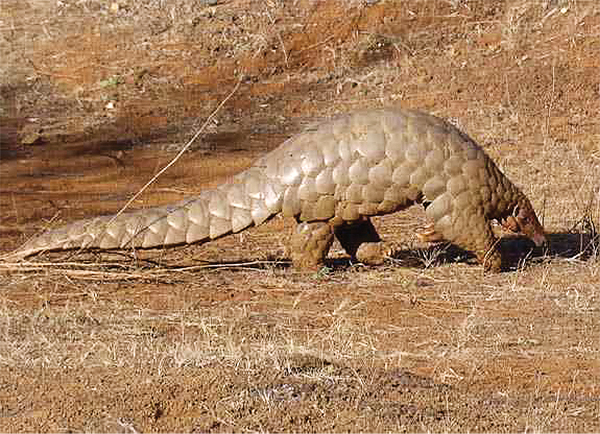
Out of the eight pangolin species found in Asia and Sub-Saharan Africa, the Indian Pangolin (Manis crassicaudata) is found in Pakistan. The mammal resides in barren, hilly areas or deserts and there have been reported sightings in the Potohar plateau when the nocturnal animal steps out of its shelter in search for food. But with the soaring demand for pangolin skin products in the international market, the mammal might soon become completely extinct.

The declining mammal population is a result of the illegal trading of pangolin scales for magic rituals, bullet-proof jackets, shoes, clothes and flesh for medicines, primarily in China. Local practitioners believe the scales have aphrodisiac properties. Nearly 181 pangolins have been illegally captured or killed in Pakistan between January 2011 and May 2012, reveals Illegal Mass Killing of Indian Pangolin (Manis crassicaudata) in Potohar Region, Pakistan, a 2012 study conducted by the Department of Wildlife Management and the Department of Zoology in Pakistan. Out of the total, 45 bodies were discovered scale-less and dumped inside an unused railway tunnel near Chakwal. Nomads and hunters from all four districts of the plateau, Chakwal, Attock, Jhelum and Rawalpindi, have been held directly responsible for the act which has become a profitable sport. Every kill secures a sum of Rs10,000 to Rs15,000, depending on the size.
“We lack information on estimates and behaviour of pangolins in Sindh, whereas it is a protected animal according to the Sindh Wildlife Protection Ordinance 1972,” says Dr Fehmida Firdous, deputy conservator for the Sindh Wildlife department. Fear of further decline in the number of Indian pangolins rises as other Asian species, especially the Malayan pangolin (Manis javanica) and the Chinese pangolin (Manis pentadactyla), approach extinction. According to the above study, the Punjab Wildlife Acts and Rules, 1975, has declared the mammal a protected species. In its recommendations it urges for the species to be moved from the category of ‘near threatened’ to ‘endangered’ in the near future.
Misconception and a general lack of awareness have also spurred killings. The anteaters are commonly sighted at graveyards where they wander in search of termite mounds, and this has inadvertently earned them the label of ‘murda khors’ or grave diggers. Pangolins with their short limbs and sharp claws dig through the mounds and, due to a lack of teeth, use their long, sticky tongues to attract prey and swallow it whole. According to experts, it’s the mammal’s very diet that allows it to play an important ecological role by serving as pest control.
Although the Indian pangolin is protected under numerous wildlife ordinances in Pakistan, poaching continues. According to the Inspector-General from the Forestry department, Syed Mahmood Nasir, one way to deter trade is to, “Place signboards and very visible ones on all points of exit (airports) to educate the customs officers.” Since protection measures are still at a bare minimum, the Azad Jammu and Kashmir Wildlife department, including religious leaders and community members, have taken it upon themselves to punish poachers, and over the past year and a half have put over a dozen behind bars, imposed heavy fines and confiscated dead animals. “Unfortunately, they (poachers) have now moved towards Punjab,” laments Conservator Wildlife Azad Jammu and Kashmir, Chaudhry Muhammad Razzaq.
George Sadiq is a member of IUCN Commission on Education and Communication.
Published in The Express Tribune, Sunday Magazine, April 6th, 2014.
COMMENTS (9)
Comments are moderated and generally will be posted if they are on-topic and not abusive.
For more information, please see our Comments FAQ

1731028448-0/Untitled-design-(37)1731028448-0-165x106.webp)















We don't spare human beings, how do you expect to let the animals live.
I am glad that the present generation of professionals at the federal and provincial levels are much better than their peers. We have seen frogs and many lizards gone extinct from our fresh waters but am very sure that pangolins may be saved with this high level of proactivity.
Seen tall foresters mailing list , please also see this site to know where Pakistani pangolin in Vietnam
http://www.cnn.com/interactive/2014/04/opinion/sutter-change-the-list-pangolin-trafficking/index.html?hpt=hp_c2
very good effort to realize the importance of this innocent mammal, indeed awareness is a major component for conservation but also we have to revise our wildlife laws and regulations and enhance the penalties to stop the ill activities beside this there is a dire need to establish WILDLIFE DESKS at airports, dry ports and border exit points especially at Sost border/ dry port gilgit to check the illegal trade of wildlife to china where there is a huge demand and market for wildlife parts. Awareness and training of customs personales will also be fruitful.
I praise the efforts of George Sadiq for highlighting this issue of significant importance. Display of sign boards and capacity building of law enforcers would definitely help. However efforts should also be made to amend /enforce the relevant laws and punish the culprits. We do have dedicated environmental experts / government functionaries in the country who are making efforts to save the environment. Unfortunately the so called powerful lawmakers in the country are perhaps themselves the biggest challenge.
Just go to OLX and you can buy any amount of pangolin scales or meat and even live animals form Pakistan
Unfortunately the smugglers are faster than the law enforcers. After wiping clean the pangolins in Africa they have moved to Pakistan. Here there is no big threat for this innocent animal. With timely action from office of IG Forests and the provinces the smugglers are now taking jus the scales and selling at 1000 $ a kilo ! now who and how to stop this? A coordination meeting on regular basis with all provinces, civil society and customs is the need of the hour !
Thanks God he IGF of the office survives despite all attempts by great Senator Raza Rabbani's brainchild the 18th Amendment. Who will look after dealing with Customs, Police, international smugglers, CITEs etc etc. What is needed at the moment to impress the government that pangolins and other animals like frogs lizards also devour mosquitos that cause dengue epidemic So wildlife must be part of any public health programme
Very good suggestion to have signboards at airports. I wish the Wildlife Department success in their efforts to protect the pangolins in Pakistan!